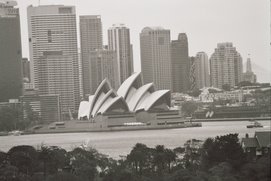I wrote this for class in college last year, I though that the issue of convergence still has relevance and I wanted to share this short essay with you.
Convergence is the concentration of and cross ownership of more than one media. This is a topic heavily debated by reporters and media owners alike.
There is an increase of concern about a monopoly of ideas and the lack of the variety of voices in the media, including, newspapers, radio, and television.
Some reporters argue that increased ownership will affect the foundation of democracy in which it stands.
Owners defend concentrated ownership by sayings it’s the only way Canadian press can survive in the new global economy.
Convergence has been an issue and has been officially debated since 1969 by the Royal Commission on Newspapers, headed by Senator Keith Davey.
By the late 1960s three newspaper chains, Thomson Newspapers Co. Ltd., Southam Inc. and Financial Post Publications controlled almost 50 per cent of Canada's English daily newspapers, which was an increase of 25 per cent since1958. These growing concentrations of ownership lead to the commission.
It is a debate that continues to grow, not only in Canada but in other countries around the world.
Recently CanWest announced it would sell its some or all of its Ten Network holdings, which are television and radio stations, to Fairfax Digital, a newspaper chain in Australia. This has sparked cross ownerships concerns there as well.
Aug. 27, 1980, is often referred to as "Black Wednesday" to the Canadian newspaper world. Two of Canada's oldest newspapers were shut down, the Winnipeg Tribune, owned by Southam and the Ottawa Journal, owned by Thomson.
Their closer allowed for monopoly in their markets and sparked national outrage. This lead to the Kent Commission headed by Senator Tom Kent.
Kent proposed the Canada Newspaper Act, which was aimed at controlling media concentration and cross ownership of newspapers in the same market.
How will convergence affect the working journalist? Perhaps the pressing issues of cross ownership, or the marriage between the print media and the electronic media.
For example, the merging of newsrooms, a reporter files a story for CTV news and the same day ends up writing the same piece for The Globe and Mail. Both are owned by Bell Globemedia
Charles Wright, director of VTV News at Six said, "I can see a time in the not too distant future when you won’t say print journalist anymore. The word 'print' won’t be part of it — it’ll be 'journalist' or 'multimedia journalist. It’s going to make more sense for them [media organizations] to deploy resources out in the world … who can feed this great beast that is the yawning mouth of multimedia, online, print, radio, TV."
Robert Matas, a reporter with the Globe and Mail, finds this prospect unappealing. He says it will require "a different type of journalist" to be able to combine the skills necessary for coordination of print with television and the Internet. As to whether he would be receptive to stepping in front of a camera, he says: "I would probably find it frustrating and restricting. I am used to telling more of a story."
CanWest said convergence allows for more efficiency in the newsrooms and allows them to reach more markets. They believe an integrated media company is important for building content and delivering it.
Larger companies also allow from for higher employment with in the company. Small independent weeklies would have significant trouble surviving. Weeklies owned by a chain are given the same programs as Dailies, such as Quark Express and News Editor Pro which are costly.
Leonard Asper, president and CEO of CanWest Global said during a speech to the Canadian Club of Winnipeg on Jan. 16, 2001
“In the future, journalists will wake up, write a story for the web, write a column, take their cameras, cover an event and do a report for TV and file a video clip for the web. What we have acquired is a quantum leap in the product we offer advertisers and a massive, creative, content generation machine.”
Completely opposite to Mr. Aspers view is Quebecor. The company said they would maintain separate newsrooms between newspapers and television.
Pierre-Karl Péladeau, president and CEO of Quebecor media Inc said.
“Information professionals working in the newsrooms of all TVA, LCN and LCN Affaires stations shall at no time transmit, receives exchange or discuss information by phone, fax, Internet or other technology with information professionals working in the newsrooms of Quebecor Media newspapers.”
Kelly Nestruck, CUP Quebec Bureau Chief, said “Journalism in Canada is in a sorry state.” He noted that convergence threatens the variety of voices in the Canadian media.
In 2001 Southam, the newspaper chain owned by CanWest announced that it would begin running national editorials in twelve of its major daily newspaper. The editorials would be written by Murdoch Davis, editor in chief of Southam, who has since left CanWest. The editorials would be run three times a week. Individual papers owned by CanWest would be prohibited from running certain editorials which did not agree with the opinions expressed by Davis at the Southam.
In response to the forced editorials 50 reporters from the Montreal Gazette removed their bylines. A letter entitled "Media Giant Silences Local Voices" appeared on the Gazette journalists' website early in December; copies were printed in non-Southam newspapers like the Globe and Mail, the Toronto Star, and Montreal's La Presse. Many other journalists have also protested the national editorial campaign.
On Dec. 14, 2001, CanWest forced the discontinuation of the Gazette’s website. David Asper's made clear his disdain for the protesting reporters at the Gazette. He referred to their protest as "childish", "self-righteous", and "part of the ongoing pathetic politics of the Canadian left". If those people in Montreal are so committed, why don't they just quit and have the courage of their convictions?"
According to Robert Cribb, president of the Canadian Association of Journalists, the danger is clear. “It posed not only a potential threat to journalism, but to the public interest.”
“The federal government has allowed these media monoliths to create themselves, and with out much regulation or much attention to what the implications might be. It doesn’t take a rocket scientist to figure out that if you allow companies like CanWest…to grow into what they are that there’s going to implications for journalism and the public interest.”
CanWest owns 14 major daily newspapers and owns more than 120 daily and weekly newspapers and flyer publications in smaller communities across Canada. They own 11 stations in eight provinces across Canada. These stations reach 94 per cent of the English speaking population. They continue to be a giant in the media industry.
Vancouver Sun reporter Jeff Lee acknowledges the convergence but, is skeptical about its intent. "There is a real danger for the public if convergence is done as a means to provide news more cheaply. If it’s done to provide the best information and content, then it can be a good thing … they (media organizations) need to remember what they’re trying to do — enrich the readers."
Some journalist, say it is undetermined at this point how convergence affects the newsroom or the work journalist. However they admit that a converged newsroom of television, newspapers and the internet it is a source of concern.
John Drabble, city editor for the Vancouver Sun and a former television producer at the CBC, does not believe that convergence will cause as much trouble for the print journalist as some people might think. "Nobody who runs a commercial television station is going to cut corners by putting someone on television who doesn't belong there," he added.
Sources:
http://www.canwestglobal.com/
http://archives.cbc.ca/IDD-1-73-790/politics_economy/concentration_press/
http://archives.cbc.ca/IDC-1-73-790-4840/politics_economy/concentration_press/clip9
http://www.yourmedia.ca/
http://www.montrealnewspaperguild.com/convergencelinks.htm
http://64.233.161.104/search?q=cache:To8dNrlaaN4C:www.peak.sfu.ca/the-peak/2002-1/issue3/fe-global.html+%22National+editorial%22+and+canwest&hl=en
http://cbc.radio-canada.ca/speeches/20010403.shtml
http://www.journalism.ubc.ca/thunderbird/archives/2000.10/convergence.html
A Life of Choice
14 years ago







1 comment:
Hey melissa aka Gandhi!
That's really good. You could have resubmitted it for our Media Ethics Assignment...the concentration of ownership topic!! That would have been funny!
Post a Comment